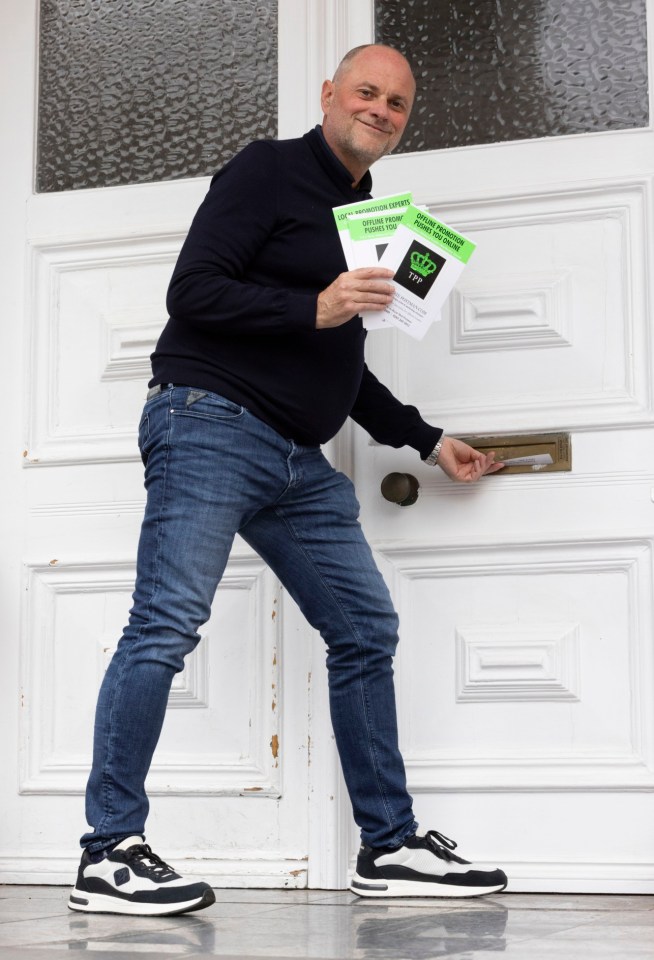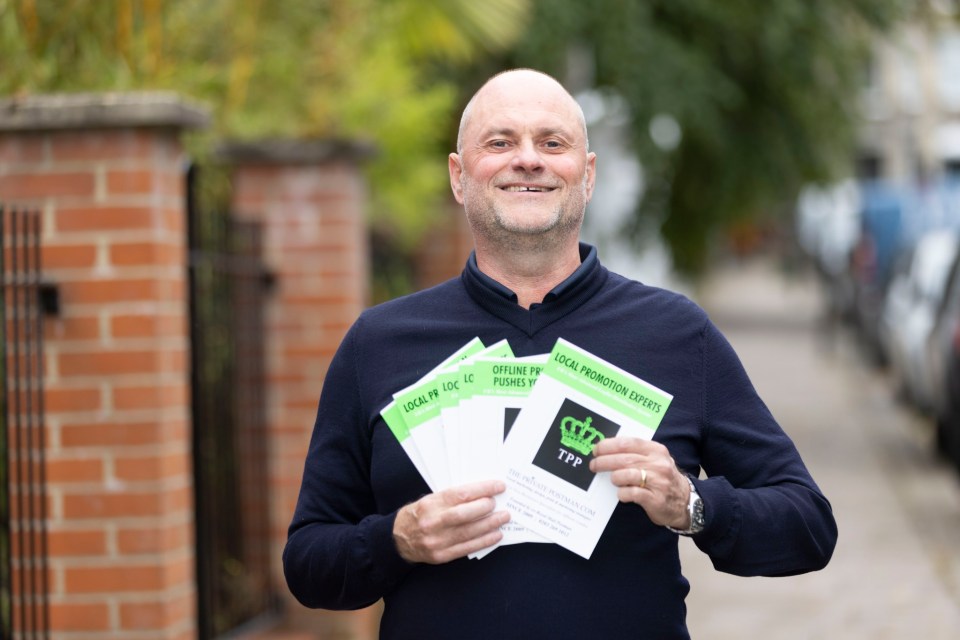WHEN Mark Redmond left his job as a Royal Mail postie in 2009, he used his last £20 to set up his own business – and now makes £850k a YEAR.
We explain how he did and how YOU can become your own boss including tips on how to get FREE cash to kickstart your dream.
Back in 2008 Mark, now 56, who lives in West Hampstead, north London, had no job and no income after leaving his £16,000 a year job as a postman.
He said: “I was skint. I had £20 to buy a week’s food, and I’d be in Sainsburys praying I could afford the bill at check out.”
He had to find more work – but didn’t want a new boss.
“I’d loved being a postie, being my own man, with no one on my shoulder telling me what to do. So I started doing work delivering leaflets. I was shocked by what I found. It was totally disorganised, no one was doing the job properly.”
So Mark decided to start his own business.
With the last £20 in his pocket, he bought toner and paper for his old printer and made leaflets advertising himself as a “reliable local ex-postman.”
He dropped them into estate agents near his bedsit in Kensal Rise, and managed to land a £1,500 job delivering 35,000 flyers for Winkworth.
“I didn’t even know how I’d manage it,” said Mark.
“So I roped in a couple of mates who’d also left Royal Mail – and The Private Postman was born.”
In London, Mark found one street of Victorian terrace houses could mean 200 households, so 1,000 leaflets could be given out in just a few hours.
In 2010, his business hit a £60,000 turnover.
Now, he has a team of more than 50 distributors across London – many from creative industries looking for flexible work. Turnover has rocketed to £850,000.
The entrepreneur’s masterstroke was buying GPS trackers, so his clients could see where every leaflet went.
Today, his systems offer photo proof and delivery tracking within a few centimetres. Clients range from local barbers to the NHS, Harrods to restaurant chains, and Mark’s firm delivers over two million leaflets each month.
He now runs the business with wife Valentina, 59.
They are now developing software to sell the tracking tech to leaflet delivery firms worldwide.
“Running a business was stressful at the start,” Mark admits. “Sometimes clients owed me £2,000 or £3,000, and I still had to pay my workers.
“In 2025 it might feel like you need to raise millions to start a business – but you don’t. You just need a good idea and the grit to keep going.”
How to become your own boss
Fancy ditching the 9-to-5 and becoming your own boss? Millions of us dream of it – and now you don’t need a fat bank account to get started.
Research by Enterprise Nation shows that nearly half of all UK adults are eyeing up a business or side hustle this year.
And there’s cash galore out there to help budding entrepreneurs, from free grants to easy-access and low-cost loans.
The Government-backed British Business Bank has a war chest of £25 billion to hand out, whilst charities like The King’s Trust and local councils across the UK dish out up to £5000 in start-up grants.
Martin McTague, at the Federation of Small Businesses, says: “Starting your own business can be incredibly rewarding, allowing you to follow a passion, solve a problem, or carve out your own career path – but you must be prepared. It can involve challenges like uncertainty, long hours and financial risk.”
Here’s how to kickstart your dream venture.
Your big idea
First you need a plan. Whether you want to open a nail bar or build an online brand, work out how your idea will stand out.
Does it have the makings of a viral hit? Fulfil a local need? Or is it something totally new?
Do your research: 42% of startups fail as lack of research means they launch products nobody wants or needs, according to CB Insights.
You’ll need a name that stands out and is easy to remember.
Check that it’s available to register as a domain online – rebranding later can costs a bomb.
You can build a site for free or low cost with Wix.com or GoDaddy.
Remember, there are restrictions on what you can choose as a company name: it can’t be too similar to others already out there.
The full rules are on the government website.
How to write a business plan
If you’re chasing grants or loans, you’ll need a formal business plan.
Include: – * how you plan to make money
* a strategy for the first five years of your business
* your target market, any rivals out there, and predictions for customer numbers.
* rough costs for things like ads, rent, or tech help
* and what you will charge, so you can forecast your potential profits.
If this sounds overwhelming, don’t panic: the King’s Trust charity has a business plan template and Government-backed Start Up Loans has easy-to-use templates for working on numbers and a business plan.
Make it official
Next, you need to register your business. Most start-ups either opt to be a sole trader, or a limited company.
A sole trader is the easiest and cheapest option: it means you’re in charge of all business decisions and keep all the profits after paying tax.
A limited company is a private company, legally separate from its founders, so anyone who runs it is named as a director.
You’ll have to submit full accounts and pay corporate tax each year – but you are protected from going personally bankrupt if the business flops.
It’s all about the money
No savings? No problem – there are loads of sources of cash for startups. Whatever you scoop, remember that a new business, you’ll need to be lean: keep costs as low as possible and spend on things that will bring in more sales.
Options to consider for financing your business:
Grants: there are more than 100 government-backed grants for UK start-ups.
The best place to start is the Business Finance Support Finder. Welsh startups use the Business Grants website, and for Scotland it’s Funding Opportunities.
More cash for startups is available from loads of local councils around the UK, so check if yours can help. In London, for example, the GLA lists grants.
If you’re under 30, the King’s Trust (formerly the Prince’s Trust) might be able to help support your new business idea.
And if your business aims to make a profit and a positive impact, UnLtd funds and mentors social enterprises
A bank loan – usually “secured”, meaning your home or another asset backs up the loan. This can be risky if things go wrong.
The Government-backed Start Up Loans Company offers up to £25,000 as an unsecured loan, with a fixed 6% interest rate. Comes with a year’s free mentoring from a business expert.
Angel investors – Wealthy individuals who swap their own cash for a slice of your firm (usually 10–25%).
They’re often former or current entrepreneurs and now the UK’s biggest source of early-stage funding. The British Business Bank, which is backed by the Government, has lots of information on how to find them.
Other places to help
Business mentors can be a lifesaver in the lonely world of entrepreneurship: 7 in 10 founders told Enterprise Matters that their mentor was essential for their business’s resilience and survival.
Find one via StartUp Loans, via industry networks, on LinkedIn, and via the Mentorsme scheme.
There are also loads of free courses in entrepreneurship to help you out, like Open University’s First steps in innovation and entrepreneurship course and Google’s Digital Garage for online founders.















